Intolerable Acts
Discover how these harsh British laws angered American colonists and helped start the American Revolution!
What Were the Intolerable Acts?
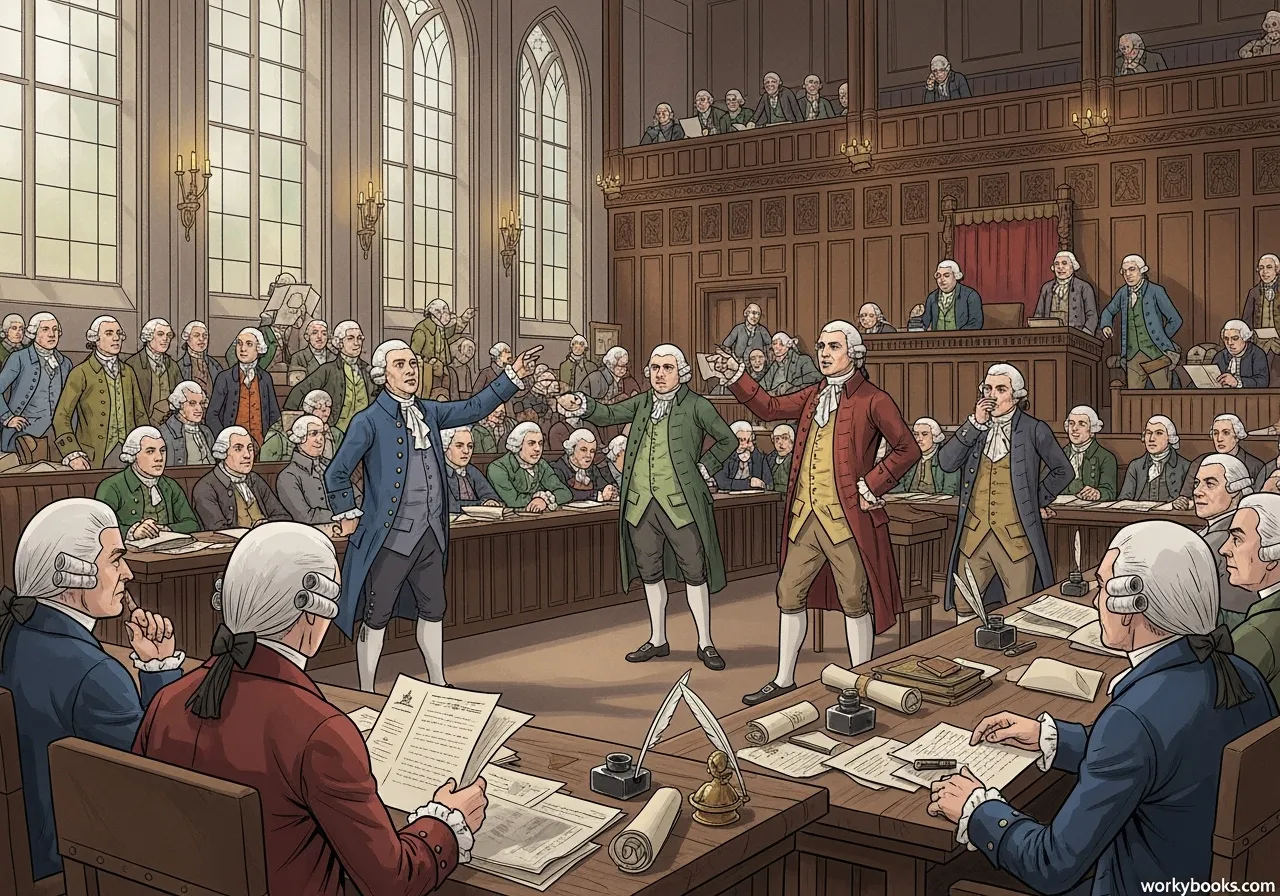
The Intolerable Acts were a series of harsh laws passed by the British Parliament in 1774 to punish the American colonists, especially those in Massachusetts, for the Boston Tea Party. The colonists found these laws so unfair and unbearable that they called them "intolerable," which means "unacceptable."
These laws were meant to show the colonists that Britain was in charge, but they actually had the opposite effect. Instead of making the colonists obey, the Intolerable Acts made them angrier and more united against British rule. This eventually led to the American Revolution.
Did You Know?
The British called these laws the "Coercive Acts" because they were meant to force the colonists to obey. But Americans called them "Intolerable Acts" because they were too harsh to accept!
The Coercive Acts
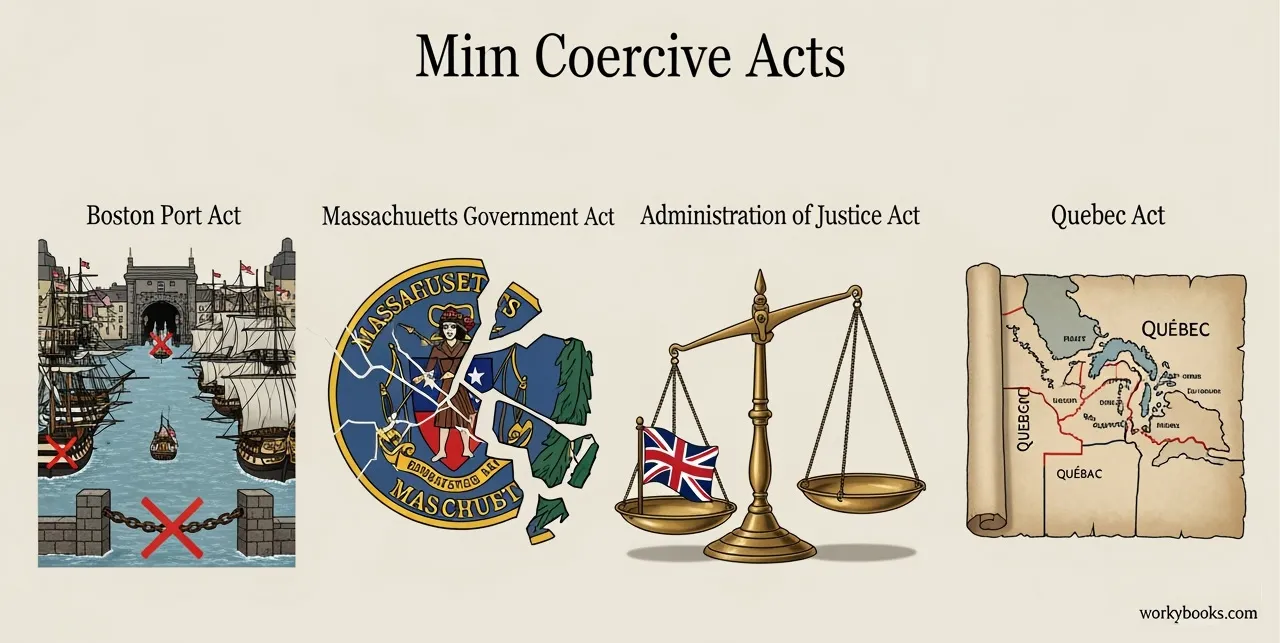
The Coercive Acts consisted of four main laws designed to punish Massachusetts and demonstrate British authority:
Boston Port Act
Closed Boston Harbor until the destroyed tea was paid for, hurting the city's economy
Massachusetts Government Act
Took away the colony's right to elect its own officials and limited town meetings
Administration of Justice Act
Allowed British officials accused of crimes to be tried in Britain instead of the colonies
Quartering Act
Required colonists to house and feed British soldiers in their homes
A fifth law, the Quebec Act, was passed around the same time and was considered part of the Intolerable Acts by colonists, even though it wasn't technically a Coercive Act. It expanded Quebec's territory into areas claimed by American colonies.
The Boston Tea Party
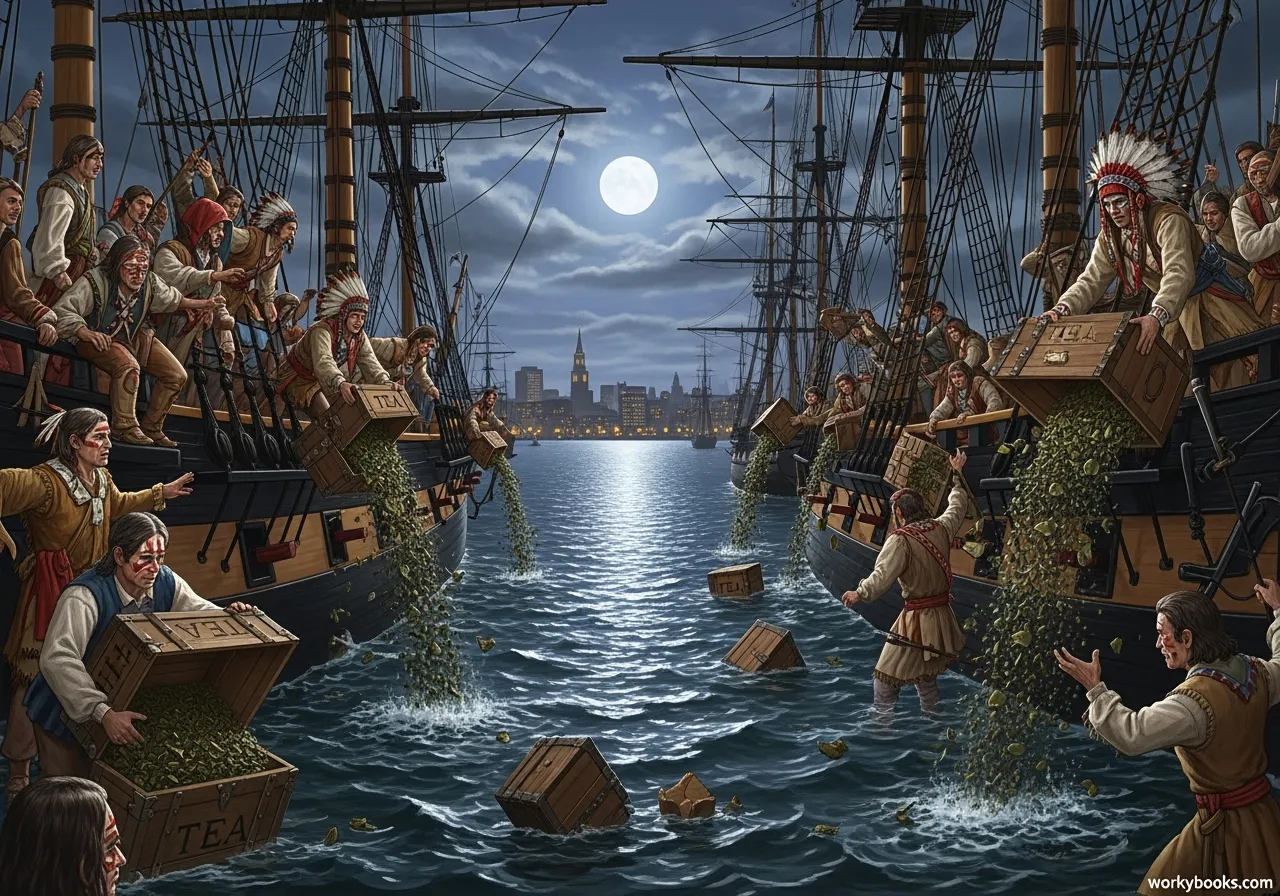
The Boston Tea Party was the event that directly led to the Intolerable Acts. On December 16, 1773, American colonists protested a British tax on tea by boarding three British ships in Boston Harbor and dumping 342 chests of tea into the water.
The colonists were angry about the Tea Act of 1773, which gave the British East India Company a monopoly on tea sales in the colonies. Even though this actually made tea cheaper, colonists were upset because it meant they were still paying a tax to Britain without having representation in Parliament.
Why Did They Dress Up?
The colonists disguised themselves as Mohawk Indians so they wouldn't be recognized and punished. However, their disguise wasn't very convincing - many people knew who they were!
The Quartering Act
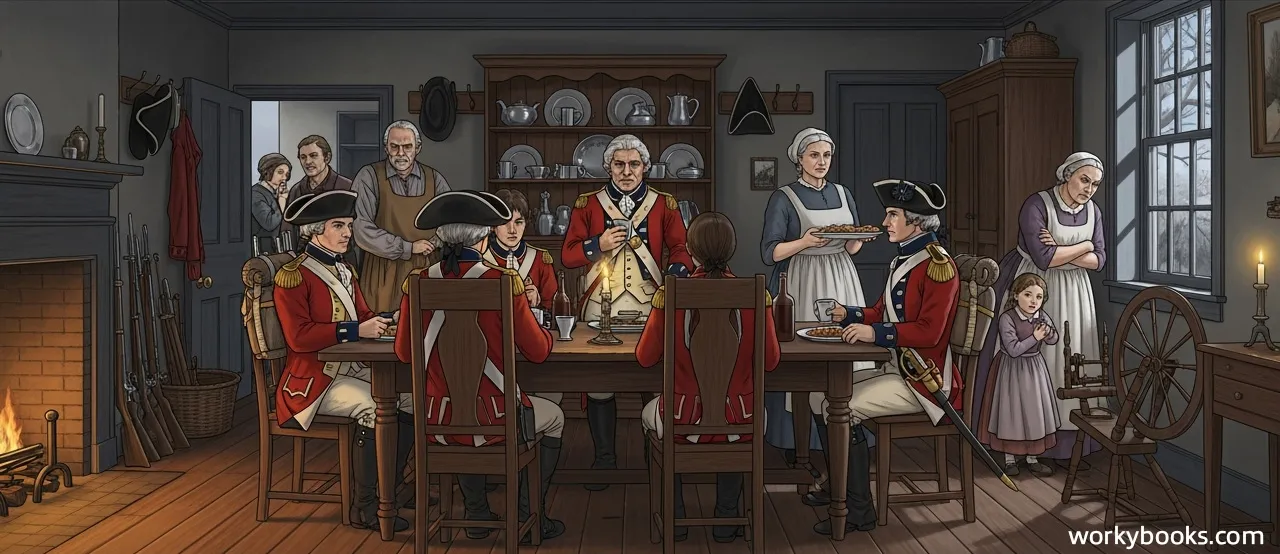
The Quartering Act of 1774 was one of the most hated parts of the Intolerable Acts. It required American colonists to house and feed British soldiers in their homes, taverns, and other buildings. The soldiers didn't have to pay for this lodging or food.
This was especially upsetting to colonists because:
- It violated their privacy and sense of safety in their own homes
- It felt like the soldiers were there to spy on them and enforce British rule
- It cost colonists money to feed and house the soldiers
- It reminded them that they were being treated as subjects rather than equal British citizens
The Quartering Act was so unpopular that it directly inspired the Third Amendment to the U.S. Constitution, which prevents soldiers from being quartered in private homes without the owner's consent.
King George III and British Response
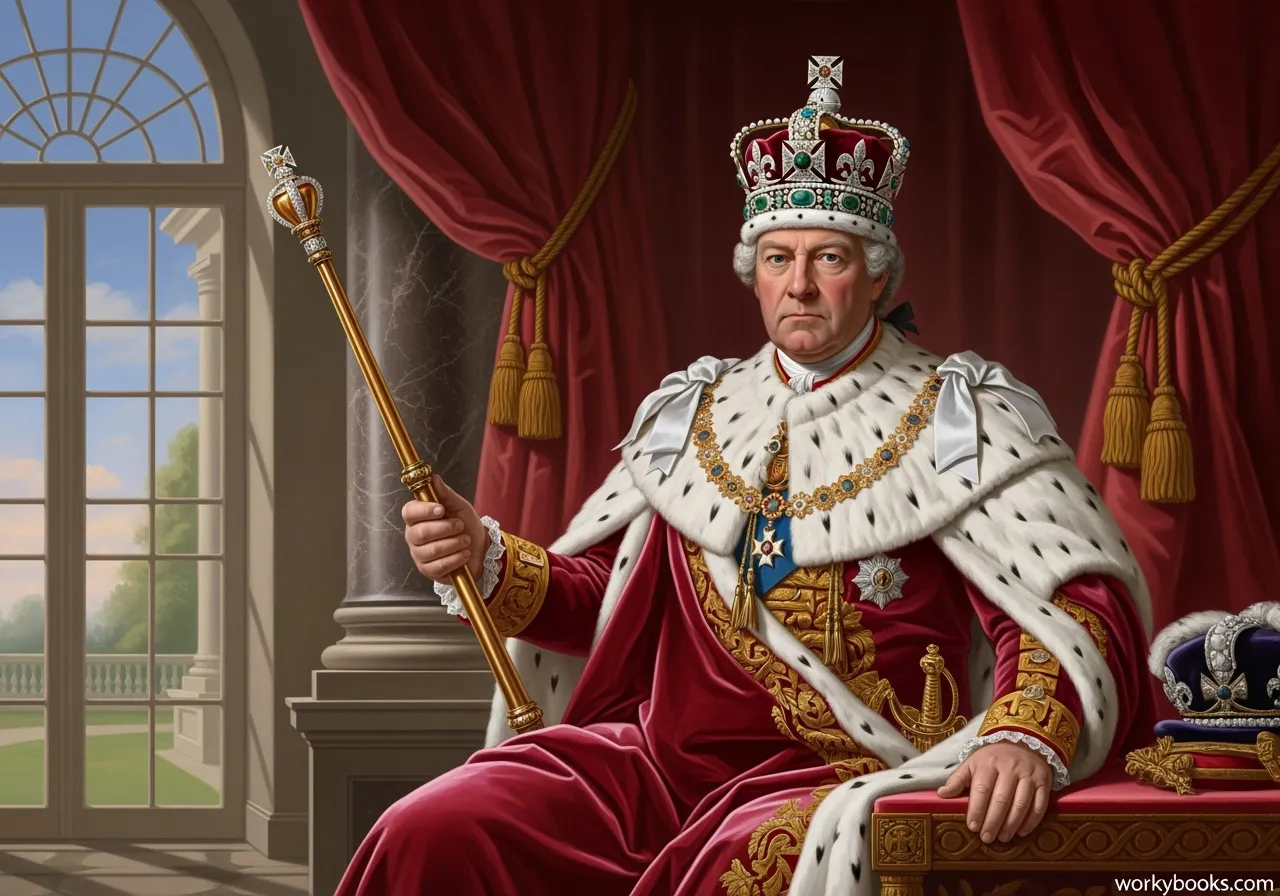
King George III was the British monarch during the time of the Intolerable Acts. He strongly supported punishing the American colonies for their rebellion, especially after the Boston Tea Party. The king believed that firm action was necessary to maintain British authority and prevent other colonies from challenging British rule.
King George III and his government thought the Intolerable Acts would:
Stop Protests
Make colonists too afraid to protest British policies
Collect Taxes
Force colonists to pay for the destroyed tea and future taxes
Show Control
Demonstrate that Britain was ultimately in charge
Instead of achieving these goals, the Intolerable Acts had the opposite effect. They united the colonies against Britain and moved them closer to revolution.
Impact and the American Revolution
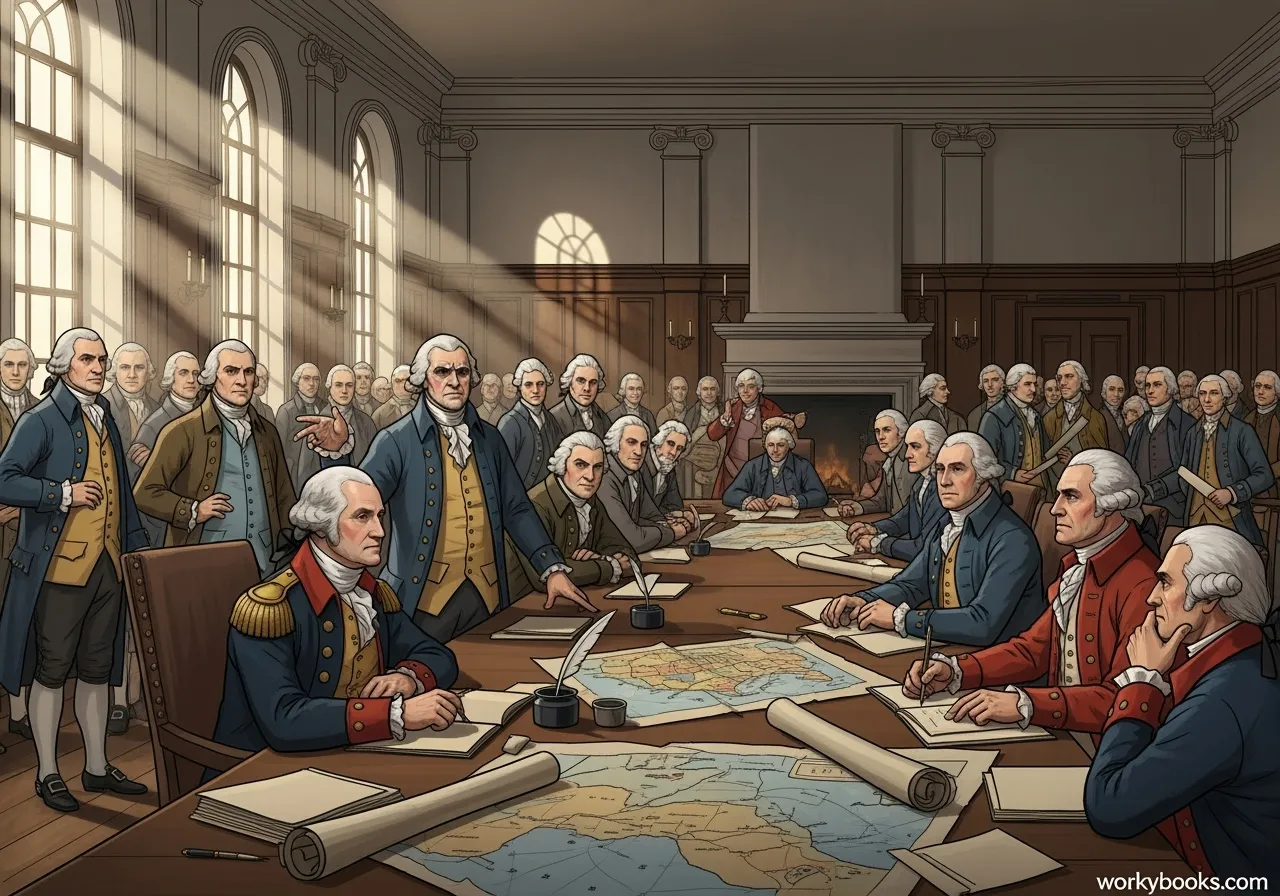
The Intolerable Acts had a huge impact on the relationship between Britain and the American colonies:
First Continental Congress
Delegates from 12 colonies met to protest the Intolerable Acts and organize resistance
Colonial Unity
Other colonies sent supplies to help Boston, showing they stood together
Battles Begin
Fighting broke out at Lexington and Concord, starting the American Revolution
Declaration of Independence
The colonies officially declared independence from Britain
The Intolerable Acts showed colonists that Britain would use its power to punish them harshly. This made many colonists who had been loyal to Britain start to think that independence might be necessary. Instead of dividing the colonies as Britain had hoped, the Acts brought them together in their opposition to British rule.
Intolerable Acts Quiz
Test your knowledge about the Intolerable Acts and their role in American history! Answer all 5 questions to see how much you've learned.
Frequently Asked Questions
Here are answers to common questions about the Intolerable Acts:
American Revolution Trivia
Discover interesting facts about the Intolerable Acts and the American Revolution!
Cost of the Tea
The tea destroyed during the Boston Tea Party was worth about $1.7 million in today's money! This was an enormous amount in 1773.
First Continental Congress
Georgia was the only colony that didn't send delegates to the First Continental Congress in 1774 because they needed British help with conflicts with Native Americans.
Third Amendment
The Third Amendment, which prevents soldiers from being quartered in private homes, is the least litigated amendment in the Bill of Rights and has never been the basis for a Supreme Court decision.
International Impact
The American Revolution inspired other revolutions around the world, including the French Revolution in 1789. The French even sent soldiers and ships to help the Americans fight the British.





